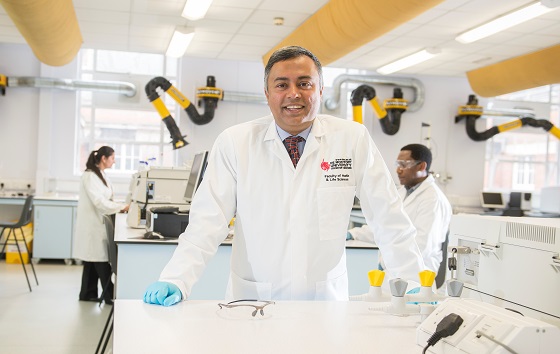A professor from De Montfort University Leicester (DMU) says the Government’s Eat Out to Help Out scheme, designed to kick start the hospitality industry during lockdown, was responsible for a huge rise in deaths among the Bangladeshi and Pakistani community.

Professor Parvez Haris, a biomedical scientist at DMU, has now warned that as social distancing and mask-wearing ends today, on so called Freedom Day, COVID could rip through the communities again.
Professor Haris, who will present his findings to global health experts at the International Festival of Public Health in Manchester this Thursday, said: “The Eat Out to Help Out scheme turned out to be an opportunity for businesses and their staff to make money they desperately needed and provided enjoyment for hundreds of thousands of customers, but it created the ideal environment for exposure to COVID-19, and the Bangladeshi and Pakistani communities bore the brunt of this”.
He said while the Government is producing health and safety guidance for different occupations, including the hospitality industry, UK local authorities need to work closely with small businesses to carry out extensive risk assessments of restaurants and takeaways, implement health and safety rules and protect workers and customers from COVID-19.
In contrast to other ethnic groups, there was a dramatic increase in deaths, among men and women from Pakistani and Bangladeshi ethnicities during the second wave of COVID last autumn and winter.
The Bangladeshi ethnicity had the highest mortality rates, 5.0 and 4.1 times greater compared to White British men and women respectively. Other ethnic groups which had seen a large increase in deaths in the first wave, such as African Caribbean and Black African, saw a fall in deaths during the second wave.
RELATED NEWS
DMU Professor says Napoleon was killed by obsessing with Eau de Cologne
DMU Early Clearing lines are open now
Join us at the next DMU Open Day
Until now, there has been no detailed explanation for this huge increase in mortality but Professor Haris believes it was all down to a number of factors relating to the Government’s Eat Out to Help Out scheme.
The Office for National Statistics shows that more than 30 per cent of the Pakistani and Bangladeshi population in the UK works in the hospitality industry, higher than any other ethnic group, while almost 20 per cent works in transport.
Professor Haris says the Government’s Eat out to Help Out scheme in August last year, which paid for restaurants, pubs, cafés and fast food outlets to offer 50 per cent discounts on meals three times a week, led to the opening up of many small food outlets, understandably desperate to cash in on the initiative, which came prior to any vaccine being available.
He explained: “It is not rocket science. COVID-19 is an occupational disease that became clearly evident in the UK through the differences in mortality rates among ethnic groups in the second wave, with dramatic increases in groups working mainly in the hospitality sector during the Eat out to Help Out scheme.
“Small kitchens in restaurants and fast-food outlets with seating were packed with staff serving unusually high numbers of customers taking advantage of these heavily discounted meals.
“Wearing masks, at least properly with the nose and mouth fully covered, in a hot kitchen environment, during busy periods and over several hours of continuous work, is unlikely to have been easy.
“Social distancing in a kitchen environment is virtually impossible due to space limitation and the need to move around.
“Furthermore, the ventilation systems in kitchens vary widely and may not have been adequate enough to eliminate virus-laden water droplets exhaled by the restaurant workers.
“Exposure of the virus between workers and customers is likely to have been higher during the scheme compared to any other periods over the last 18 months. All of this will have created an ideal environment for the transmission of the virus between restaurant workers and customers and thereafter the virus was being transmitted to family members and others in the community.”
Professor Haris will also tell the conference on Thursday that the Office of National Statistics figures show the Bangladeshis and Pakistanis make up the highest percentage of people working in the transport and communication sector, at 17.8 per cent.
“This category of workers, particularly taxi and mini-cab drivers, would have been more active taking customers to and from restaurants. The drivers needed the money and the customers were after a much-needed night out ,” he said.
“To protect lives and protect the NHS, we need to address the occupational exposure in businesses such as takeaways, restaurants, cafes, pubs, taxis and mini-cab firms, many of which are small businesses and lack the necessary resource to implement health and safety procedures to protect their staff.
“The decrease in mortality among the Black African and African Caribbean communities can be explained by the fact a higher percentage (43.6%) of people from this group work in public administration, education and health. These are mainly large organisations that have the necessary resource to carry out risk assessments and rigorously apply health and safety measures including the possibility to work from home.
“We need to use data and act in a targeted manner and this includes identifying the main sources of exposure to COVID and preventing it at the source, before it reaches homes and the community. Government support is vital to make sure this happens.
“Grants should be available for small businesses to improve ventilation. That could make a significant impact in not only reducing COVID-19 infections but also improving the quality of air in places such as kitchens that could see improvements in the long-term health of workers.
“Ultimately it is not about race, ethnicity or class, it is about saving human lives and data should be used to identify who is at risk, and why, and how things can be changed for the better.”
Posted on Monday 19 July 2021